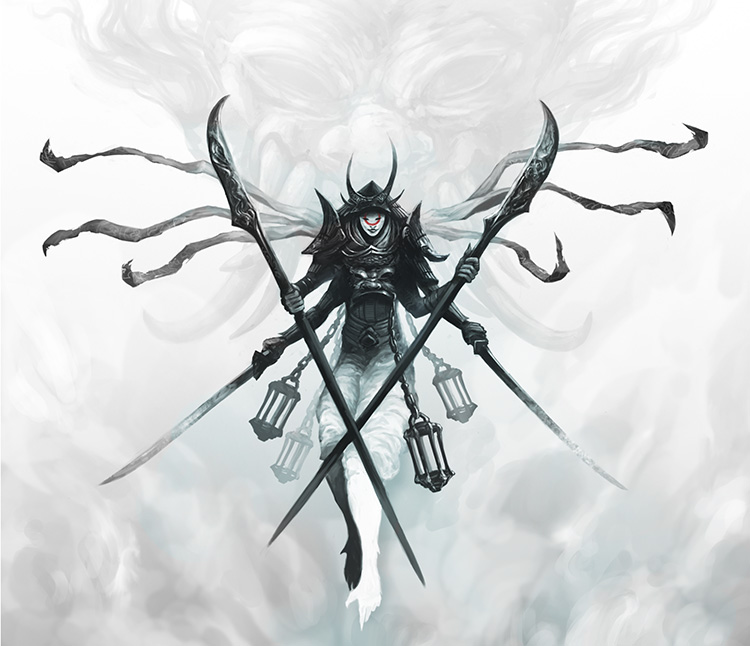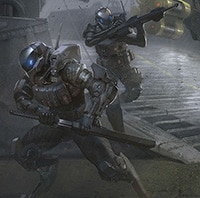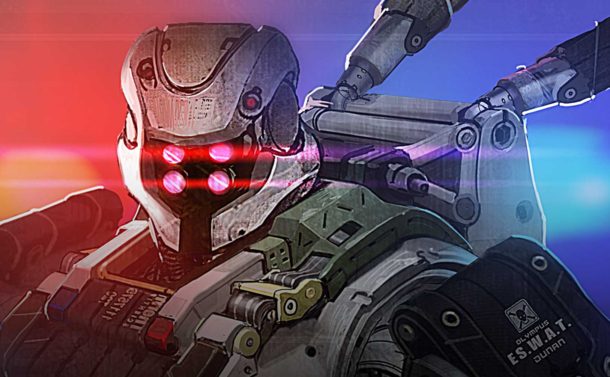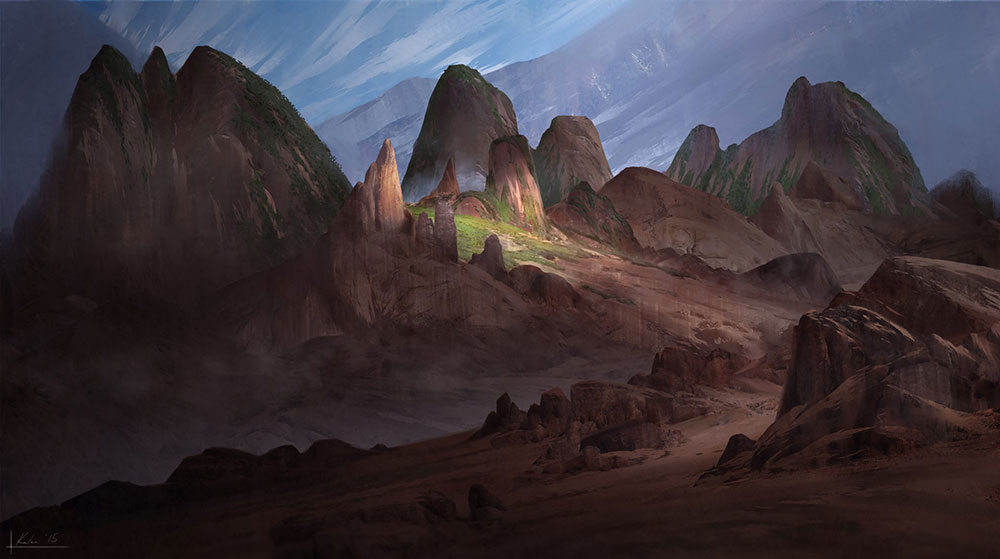
by Eliott Lilly | Apr 25, 2016 | Questions
Question Submitted from Mandee H. Concept art by Kalen Chock
Hi, I am a sophomore in highschool and I was wondering:
What kind of schools should I look at if I am interested in becoming a concept artist for games? What kind of degree should I shoot for? Is getting an online degree a good idea? Should I start off my career as a freelancer or working for a studio? As I said earlier, I’m still in high school so I am not quite sure what to do when I graduate to start off my career.
Thank you for taking the time to read my email.
Hey Mandee, thanks for reaching out. I’m glad you found the blog. My responses are inline.
What kind of schools should I look at if I am interested in becoming a concept artist for games?
- Have you visited the Resources page? There’s an entire section dedicated to Concept art focused schools and even more info can be had in the downloadable .pdf list.
What kind of degree should I shoot for? Is getting an online degree a good idea?
- In this industry since you will be hired based on your merits as an artist (aka. your portoflio) degrees don’t really mater as much. Don’t focus on the degree itself, rather the education you will receive. I wrote “An Insider’s Guide For Student’s” for student’s like yourself who have specific questions about the types of classes you should be taking, colleges to attend, etc. Check out chapter 3 (How to make the most of your education and schooling).
Should I start off my career as a freelancer or working for a studio?
- If you want to work in video games, then I would aim to be an in-house artist before you set off on your own to freelance. This will give you time to familiarize yourself with the process of game development, grow as an artist and develop the communication skills (both vocally and artistically) to deliver successful concepts to clients. Plus the work experience will look good on your resume, and future clients will have confidence in your abilities knowing that you have worked on “big” projects in the past. If you have the time, you may also consider taking an online course from Chatham University or other similar educational institutions. Since knowledge is key to everything you do in the real world, having a degree or two might help you in the future
If you need further insight, I would highly recommend that you pick up your own copy of An Insider’s Guide For Students. I wrote that book as straightforward and honest as I could in hopes to answer your exact questions and more. Check it out and let me know what you think. If you still have questions after reading it, I would be happy to answer them.
-Eliott
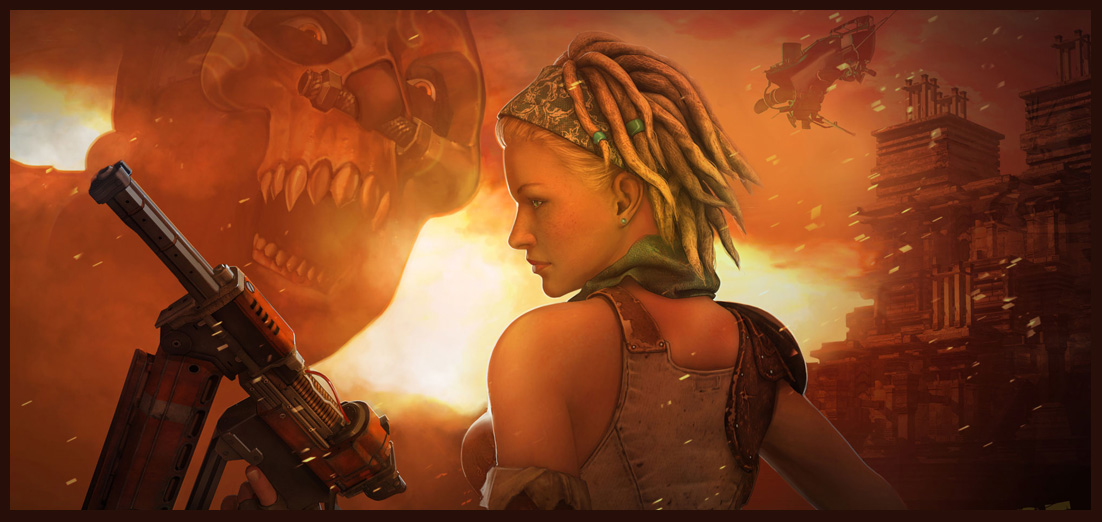
by Eliott Lilly | Apr 18, 2016 | Questions
Question submitted by Oliver B.
Hey Eliott, I’m an aspiring concept artist (hobbyist for now, still in high school), I have a important question concerning concept art. After a few months I realized that it takes an incredible amount of work to make it into the industry, I’ve heard some artists who are really amazing worked their asses of for years. Im talking about amazing, high-end professionals such as yourself or even guys like Eytan Zana, John j. Park or Maciej Kuciara. They obviously spend at least 10 hours a day on this stuff for years (probably more?). So Im asking you how it is possible to get this amount of work done each and every day. I’m usually totally exhausted after 5 hours of painting, when the brain runs out of glucose. How should I manage to triple this amount then?

Hey Oliver, that’s a great question. The short answer is: find the motivation to keep going. Your “drive” (willingness to succeed) is your strongest ally. If its really important to you, you will find a way to power through the exhaustion. Take breaks of course- but power through. How do you find the time? Brace yourself… you might not like the answer. The reality is: to get as good as those artists you mentioned, then you will likely need to sacrifice as I am sure they did (I know I had to). Here are some things you can do
Wake up earlier and/or go to sleep later.
If you can gain an extra hour each day, that adds up to an additional 7 hours a week. Going to high-school I averaged 6-8 hours of sleep each night. In college it was 3-5. Right now, in my professional career I get about 6. (but the hard work in college has already pad off. I got the job) It can be exhausting, but if you are able to develop and maintain a routine of discipline you’d be better off for it.
Get your parents involved
Inform your parents of your intentions and plans, so they understand if you need to stay up later and do not volunteer you for after-school activities/ events that you may not even care for. It also helps if the will sign you up for art classes, etc. My dad used to wake me up at 5 am, so we could get to school an hour early and draw.
Draw in your spare time
Every chance you get. Between classes. During lunch. Got five minutes?-Pull out your sketchbook and doodle. You’d be surprised how much you can draw while taking the bus to school or sitting on the toilet.
Reduce the amount of tv watching (And Video games too).
Keep the tv watching/ video game playing down to an hour each day. Seriously. Use the gained time to draw.
Take summer art classes
Even though school is out, you will need to stay sharp on those skills. While everyone else is out playing, you need to be drawing and improving. Sucks, i know, but this is the truth. I took college summer classes 4 years in a row while still attending high school. Good times.
Don’t worry, those are just a few suggestions- you can still have a social life with friends. I know they sound intensive, but the more you can do, the better off you will be. In my book: “An Insiders Guide For Students” I talk about this very topic and cover in great length, the things you should be doing on your own time, what you should be learning and more. If you haven’t already, you might consider picking up a copy for a more in depth answer.
Hope that helps.
-Eliott
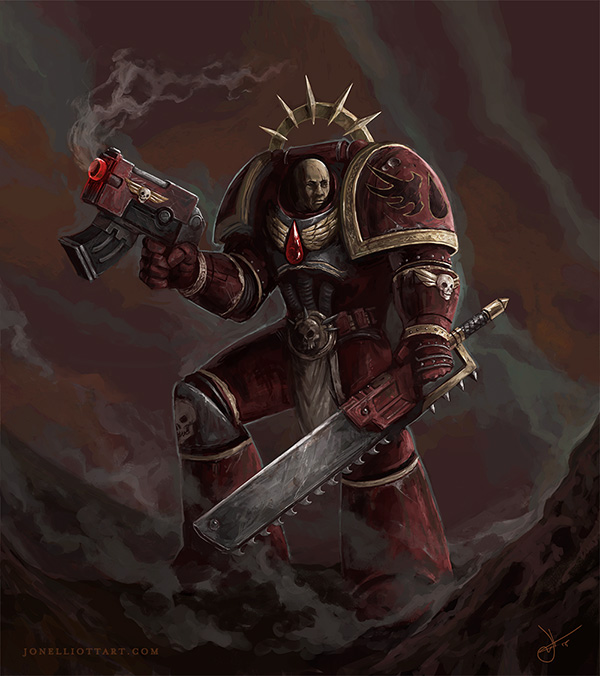
by Eliott Lilly | Apr 11, 2016 | Questions
Question submitted by Jonathan E.
Hey Eliott!
What are the day-to-day operations of a concept artist are like? I am interested to know the sort of artistic executions concept artists are responsible for, and what I can expect to be doing as one (Not the daily routine that a concept artist goes through) Will I be working on finished images or sketches? The artwork I’ve seen on websites like Artstation or Kotaku is always “finished” and “complete”, yet I heard from an ex-Blizzard employee, that the majority of his day was spent in black and white line drawings. I’ve also heard it said “I hope you like drawing people’s faces for 10 hours a day for 4 years”. That of course seems extreme, but the point very much comes across. So which one is it? To that same point, what sort of workloads do concept artists deal with? I’ve heard it said (also from an ex-Blizzard employee) that concept artists don’t endure the same levels of crunch as the “heavy lifting” sits within the post-production / polishing phases. Is this true?
Thanks so much! Check out some of my artwork.
Jonathan
Hey Jason, great questions. I think it all depends on your work situation.
If you are Freelancing:
Mitigating a client’s expectations is crucial since they will be offering you work based on your perceived abilities. If your portfolio showcases work of a high caliber, and you promise the client a similar result, then that is what they will come to expect from you. When I deal with clients, I often explain to them that in the same time it takes me to do a single super polished image, I can produce 6 or 8 simple greyscale studies that further explore ideas. Since it’s their dollar I leave the final choice up to them, but here’s what I’ve learned:
Bigger companies with bigger budgets, don’t really flinch at this, since they usually extend month long contracts (instead of a piece-by-piece basis) and they ask me to do a combination of both. For example, when working on Black Ops 3, I was the “Weapons guy”. Turnaround times were tight, and for efficiency, my daily deliverables were done strictly in line drawings, greyscale images, napkin doodles etc. Once the design was approved I would be given a bit more time to do the final render pass in color. Occasionally I would even have enough time to use 3d/ Keyshot to assist.
And that’s all did for 2 years. Weapons (and the occasional vehicle). I must’ve done 300 weapon concepts to arrive at the 27 that actually made it into the game. That’s the reality. The comment about “drawing people’s faces for 10 hours a day for 4 years” isn’t really that far off.
Working with smaller companies and/ or individuals is a similar experience, but, more emphasis and time is usually given to the final image. Since it will usually be used for both production and marketing. I still might give them a greyscale image or two for speed, but will do far fewer revisions and idea exploration. The subject matter I get to draw also varies greatly, since they may need me to do several things, instead of one thing over and over again.
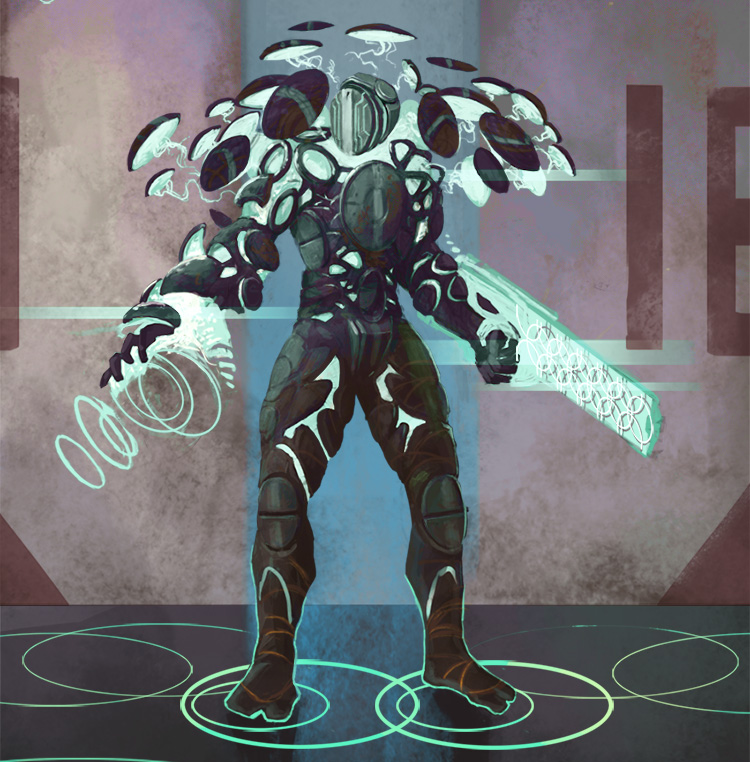
If you are working in house:
My experience has varied working from job to job a studio. Because the Art Director is in the same building, the feedback process is much quicker and artwork can be reviewed in real time. There was also friendly competition between the other in house concept guys, and we were all trying to out-do each other. As such, I spent most, if not all, of my time painting high quality images in color. (Still not to the level of polish you’d find Art Station though).
Even though the “heavy lifting” is done in the polish phase of game creation, a concept artist work is never really done. Trust me, when everyone else is crunching in the studio, you will be too. Partly cuz you’ll get random tasks from your art director, (that you will likely have absolutely no business doing) but also in part because you will feel guilty about leaving at 6pm, when everyone else is staying till 10. There’s a compromise thereof course, but you get the notion.

Ultimately, the theme that remains consistent between every type of clients is their desire for the highest quality of work in the shortest amount of time, and at the lowest cost to them. It’s up to you to decide what you are comfortable providing them with.
I hope this helps.
-Eliott

by Hector Ruiz | Apr 8, 2016 | Resources, Reviews

What to Look for in Concept Art Education
This week ending 04/09/2016 we discuss an important subject that goes through a lot of concept art students. The topic of education and how to succeed in this career are the most asked questions from students. Well, that and what kind of brush does a seasoned artist use to paint epic works. In all seriousness let’s discuss some thoughts on concept art, education, what to look for, and how to get the best of it. These may not cover a lot of the questions students tend to ask, but will certainly scratch some of the big ones. We’ll break this down into several parts that will be continued in the future. Enjoy!
As a student and teacher myself, I’ve had a lot of these questions and having attended several classes and schools with concept art in mind, I might be able to shed some light into this subject.
1. Where do I go to school?
You can go wherever you want. Commitment is the key to getting into this career. The more time you’re willing to spend on your craft, the better you’ll be and the faster you’ll get there. It’s understandable that life and things get in the way, but how much you want something will determine what you’re willing to sacrifice to get there.
2. What’s the best school to attend?
Basically, you have to think of your goal and what exactly you want to do and work on. Then, you can evaluate the school that will give you the skills you need without offering other subjects that might distract you. If you want to be a concept artist and designer, don’t spend time learning how to do things unrelated to your focus. I’ve attended schools that offer so many things and give you so many options that in the end have slowed me down. Focus is key. If you want to be a concept designer, don’t go to an illustrator school. Don’t get me wrong, there are many ways to get here and some things taught in schools will give you a greater sense of life, but if you really want a more refined and straight way of becoming a concept artist, attend schools like FZD School of Design or Brainstorm. They’ll sure whip you into shape.
3. When I graduate I will have a job as a concept artist and will also get paid well.
Well…graduating from a school, be it something like Art Center will not guarantee you a job at Naughty Dog. It takes networking, a good work ethic, good portfolio work, great personality, more self-improvement, etc. One of the things i tend to look for as well is whether or not the school offers job related aid. It might be a school that hosts senior shows where recruiters from gaming and film industries attend. This is so big when it comes to selecting a school. Do be careful with how schools market themselves. Some schools might change their policies or give you misleading information on this. You also have to look at the economy and know about the industry your getting yourself into. Sometimes you may have to bounce from place to place to keep a steady paycheck. Other times you might not have a job for a few months. It’s not a sure thing so don’t expect the job to be waiting for you because you have a degree or certificate from a certain school. Now, if you have the right skills, you’ll have an easier time finding resources or jobs. Just be weary of not getting comfortable or else someone more eager will take the job from you.
4. I don’t have money to move to California or Singapore.
In this age of technology is not an absolute deal breaker not attending schools in person. There are several good schools available with great teachers. If you absolutely have to attend a school in person, save some money while you attend online classes. Remember to always improve. Education is expensive as it is so adding a big move can be even more daunting. Again, we have to go back to how committed you are to attaining your goals. You can watch the movie Rudy movie as an inspiration if you’d like.
We’ll stop here for now and will continue in future segments. I hope this can help some students who are wondering about how to get there. If you’d like send us some questions or stories on how you got to where you are.
Want to help us grow our resources section? If a resource has helped you greatly please e-mail it to me or any suggestions
to: me@eliottlillyart.com. I will be keeping this list updated as I discover new entries. Thank you--

by Eliott Lilly | Feb 17, 2016 | Questions
Question submitted by Noel P.
I’m currently learning Google Sketchup. Would that be adequate for the industry?

Your question “What software should I use?” is one I get asked a lot. The short answer is “Yes, Sketchup is a good program to know”.
The longer answer would be:
Well it depends on your intent. If you want to use a 3d program to help you with your designs, perspective, etc, then any program that you are familiar with, will be a powerful addition to your skill set. Google Sketchup was designed mainly for architects, and therefore has its limits, but if you can get the results you are after from it, then its worth while. Plus the program is ever evolving and improving, so who know what other features will be added down the line.
If your intent was to learn the tools that the professionals use when developing a video game, then you may be better off learning industry standard software like Max, Modo, and Maya to name a few. That said, I should also point out that there is no actual “industry standard”. Since the software used varies from shop to shop, the only way to know which studio uses which software is to do some research on a prospective studio (and even then, getting answers can be difficult, and the studio may shift software at any time).
Honestly, since nothing is really guaranteed, the best you can hope for when using a 3D program is to understand the core concepts of 3d modeling and be able to retain them across multiple programs. Obviously the more programs you know, then the more you can do, so knowing multiple programs is the best solution.
Hope that helps





